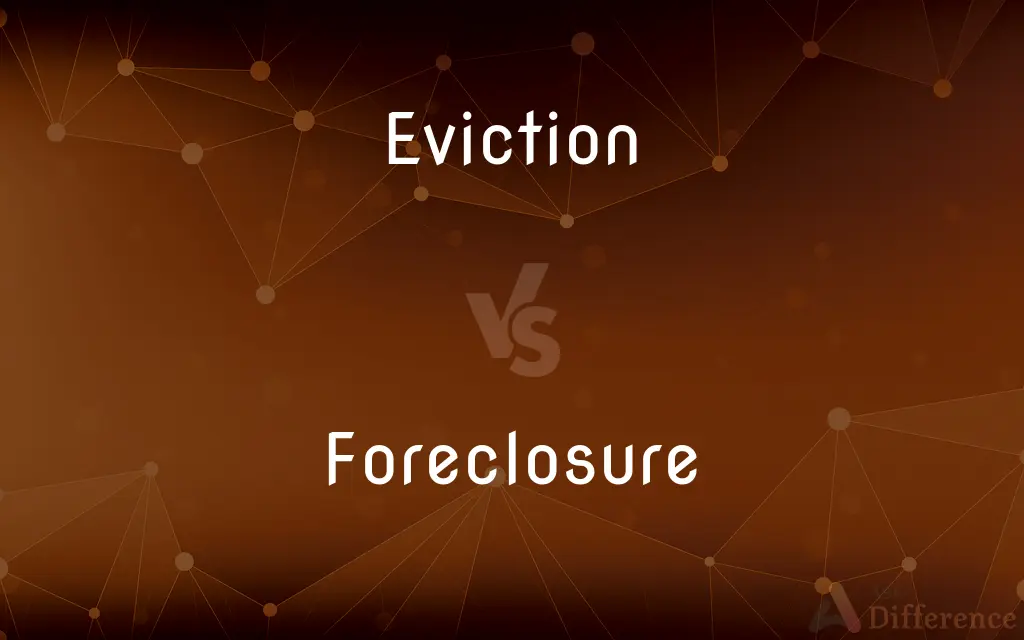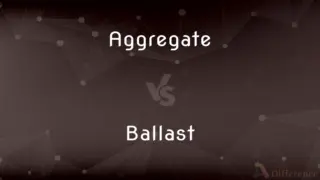Eviction vs. Foreclosure — What's the Difference?
By Tayyaba Rehman & Fiza Rafique — Updated on April 4, 2024
Eviction involves removing a tenant from a property due to lease violations or non-payment, while foreclosure is a legal process where a lender seizes a homeowner's property due to unpaid mortgages.

Difference Between Eviction and Foreclosure
Table of Contents
ADVERTISEMENT
Key Differences
Eviction is a legal process initiated by a landlord to remove tenants from a rental property, usually for not paying rent or violating lease terms. Whereas, foreclosure is a legal process initiated by a lender or bank to reclaim ownership of a property when the homeowner fails to make mortgage payments.
In an eviction, the dispute is between a landlord and a tenant over the terms of a rental agreement. On the other hand, foreclosure involves a dispute between a homeowner and a lender regarding the terms of a mortgage loan.
Eviction processes are typically faster, possibly concluding within weeks, depending on local laws. Foreclosure, however, can be a lengthy process, often taking several months or even years to complete.
The outcome of an eviction is that the tenant may be forcibly removed from the property and potentially owe back rent and legal fees. In contrast, foreclosure results in the homeowner losing ownership of the property, and it can severely impact their credit score.
Evictions can occur for various reasons, including non-payment of rent, damage to the property, or illegal activities. Foreclosures, however, occur solely due to the homeowner's failure to make agreed-upon mortgage payments.
ADVERTISEMENT
Comparison Chart
Initiated By
Landlord
Lender/Bank
Reason
Lease violations, non-payment of rent
Failure to make mortgage payments
Legal Process
Generally quicker, can vary by location
Usually lengthy, involves court and potential auction
Outcome
Tenant must vacate, may owe money
Homeowner loses property, impacts credit score
Dispute Between
Landlord and tenant
Homeowner and lender
Compare with Definitions
Eviction
Tenant must leave the property, might owe rent and fees.
After the eviction, the former tenant struggled to find new housing due to the eviction record.
Foreclosure
A legal process where a lender takes ownership of a property due to unpaid mortgages.
The bank initiated foreclosure proceedings after the homeowner missed several mortgage payments.
Eviction
Can be quick, depending on jurisdiction.
The eviction process moved swiftly, and the tenant was ordered to vacate within 30 days.
Foreclosure
Homeowner loses property and faces credit damage.
The foreclosure severely impacted the homeowner's credit score, making future loans difficult.
Eviction
Non-payment of rent, lease violations, illegal activities.
The eviction was due to the tenant's repeated late rent payments and noise complaints.
Foreclosure
Failure to make timely mortgage payments.
Foreclosure was inevitable once the homeowner defaulted on the mortgage for six months.
Eviction
A legal process by which a landlord removes a tenant from a rental unit.
The landlord filed for eviction after the tenant failed to pay rent for three consecutive months.
Foreclosure
Inability to keep up with mortgage payments.
After losing his job, the homeowner couldn't afford the mortgage, leading to foreclosure.
Eviction
Based on violations of rental agreement terms.
The eviction notice cited unauthorized pets in the apartment as a breach of the lease.
Foreclosure
Lengthy, can take months to years.
The foreclosure process dragged on for over a year, leaving the homeowner in limbo.
Eviction
Eviction is the removal of a tenant from rental property by the landlord. In some jurisdictions it may also involve the removal of persons from premises that were foreclosed by a mortgagee (often, the prior owners who defaulted on a mortgage).
Foreclosure
Foreclosure is a legal process in which a lender attempts to recover the balance of a loan from a borrower who has stopped making payments to the lender by forcing the sale of the asset used as the collateral for the loan.Formally, a mortgage lender (mortgagee), or other lienholder, obtains a termination of a mortgage borrower (mortgagor)'s equitable right of redemption, either by court order or by operation of law (after following a specific statutory procedure).Usually a lender obtains a security interest from a borrower who mortgages or pledges an asset like a house to secure the loan. If the borrower defaults and the lender tries to repossess the property, courts of equity can grant the borrower the equitable right of redemption if the borrower repays the debt.
Eviction
To put out (a tenant, for example) from a property by legal process; expel.
Foreclosure
The act of foreclosing, especially a legal proceeding by which a mortgage is foreclosed.
Eviction
To force out; eject
"U.S. troops defeated and evicted the Spanish from the Philippines" (Robert D. Richardson).
Foreclosure
A property that has undergone foreclosure
Decided to purchase a foreclosure.
Eviction
The act of evicting.
Foreclosure
(legal) the proceeding, by a creditor, to regain property or other collateral following a default on mortgage payments
Eviction
The state of being evicted.
Foreclosure
(psychoanalysis) The absence of a symbolic father for a fatherless child, as a cause for psychosis.
Eviction
The act or process of evicting; or state of being evicted; the recovery of lands, tenements, etc., from another's possession by due course of law; dispossession by paramount title or claim of such title; ejectment; ouster.
Foreclosure
The act or process of foreclosing; a proceeding which bars or extinguishes a mortgager's right of redeeming a mortgaged estate.
Eviction
Conclusive evidence; proof.
Full eviction of this fatal truth.
Foreclosure
The legal proceedings initiated by a creditor to repossess the collateral for loan that is in default
Eviction
Action by a landlord that compels a tenant to leave the premises (as by rendering the premises unfit for occupancy); no physical expulsion or legal process is involved
Eviction
The expulsion of someone (such as a tenant) from the possession of land by process of law
Common Curiosities
How long does the eviction process take?
It varies by location, but it can be as quick as a few weeks.
Who initiates a foreclosure?
A lender or bank when a homeowner fails to make mortgage payments.
What are the consequences of foreclosure for a homeowner?
Loss of property and a significant negative impact on credit score.
Is foreclosure always due to missed mortgage payments?
Yes, foreclosure results from failing to keep up with mortgage payments.
Can a homeowner stop a foreclosure?
Yes, by catching up on payments, loan modification, or selling the property.
What triggers an eviction?
Lease violations or non-payment of rent by the tenant.
What's the impact of eviction on a tenant?
It can lead to difficulties in renting future properties and might include owing back rent and fees.
Can a tenant stop an eviction?
Yes, if they remedy the lease violation or pay overdue rent before a certain deadline.
Does foreclosure affect credit immediately?
Yes, it can immediately impact the homeowner's credit score once reported.
Are eviction records public?
Yes, eviction proceedings and outcomes are typically part of the public record.
Can foreclosure be reversed?
Once completed, it's difficult but possible through legal actions or by redeeming the property.
What happens to tenants during a foreclosure?
Tenants may be evicted or allowed to stay under certain conditions depending on local laws.
Do both processes involve court action?
Yes, both eviction and foreclosure involve legal proceedings.
What rights do tenants have during an eviction?
Tenants have rights that vary by jurisdiction, including notice and the ability to contest the eviction.
How does foreclosure affect the housing market?
Foreclosures can decrease nearby home values and contribute to market instability.
Share Your Discovery

Previous Comparison
Aggregate vs. Ballast
Next Comparison
Kurta vs. SherwaniAuthor Spotlight
Written by
Tayyaba RehmanTayyaba Rehman is a distinguished writer, currently serving as a primary contributor to askdifference.com. As a researcher in semantics and etymology, Tayyaba's passion for the complexity of languages and their distinctions has found a perfect home on the platform. Tayyaba delves into the intricacies of language, distinguishing between commonly confused words and phrases, thereby providing clarity for readers worldwide.
Co-written by
Fiza RafiqueFiza Rafique is a skilled content writer at AskDifference.com, where she meticulously refines and enhances written pieces. Drawing from her vast editorial expertise, Fiza ensures clarity, accuracy, and precision in every article. Passionate about language, she continually seeks to elevate the quality of content for readers worldwide.
















































